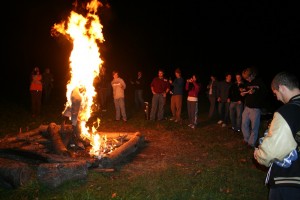Today we commemorate Guy Fawkes’ Gunpowder Plot of 1605, in which several important English Catholics – led by Sir Robert Catesby – attempted to assassinate the recently crowned King James I, by blowing up the Houses of Parliament during its state opening. The plan was famously thwarted, however, when one of the conspirators alerted an MP friend Baron Monteagle via an anonymous letter requesting that he avoid the state opening. Monteagle alerted the Secretary of State Robert Cecil, whose search of Parliament uncovered the conspirator Guy Fawkes hiding in the basement with 36 concealed barrels of gunpowder – enough to raze the entire House of Lords to the ground. Torturing Guy Fawkes forced him to disgorge much information about the various Gunpowder Plotters, most of whom were pursued and brutally killed, the rest suffering grotesque torture and that most protracted of executions: hanging, drawing & quartering.
On November 5th 1605 – the night of the conspiracy’s discovery – large beacon fires are said to have been lit by relieved Londoners, re-igniting that same anti-Catholic outrage felt seventeen years previously when Philip of Spain’s 130-ship Armada failed their king’s ‘divine’ mission to subdue and re-Catholicize the English. The foiling of the Gunpowder Plot resulted in an annual lighting of bonfires by the public, a tradition which continued thereafter until – sometime during the 1670s – an effigy of Guy Fawkes is recorded as having been added occasionally. Effigies of the Pope are also reported to have been thrown atop the bonfires during this early period. However, it was the habit of burning Guy Fawkes in effigy which sustained into the 20th century, eventually resulting in the fetishizing of the ‘guy’ itself, which would be trailed around local streets and displayed outside shops and pubs, while its pre-teen creators hollered: “Penny for the guy”.
Quite why the Guy Fawkes tradition has – above other similar events – endured into Modern Times remains a mystery, especially considering England’s tumultuous 17th century also threw up Oliver Cromwell’s execution of King Charles I, the rise of a whole brace of false messiahs, cult leaders and so-called prophets during the Civil War, plus the subsequent hanging at Tyburn of Cromwell’s dead rotting body by irate royalists. With all of this to choose from, perhaps the British public’s decision to continue burning poor old Guy Fawkes just reveals our enduring suspicion of Catholics. But I sincerely doubt it. Instead, I believe that the continued success of Bonfire Night into modern times is solely because its constituent parts facilitated for the general public certain atavistic urges that would otherwise have been frowned upon by good Christians. For what reasons – other than the opportunity to communally burn in effigy an ancient enemy – could generations of British have been goaded into enduring centuries of freezing November evenings, nourished only by jacket potatoes, hot drinks and fireworks?
[Written by Saoirse Ó Gradaigh]



7 Responses to 5th November 1605 – Guy Fawkes and the Gunpowder Plot